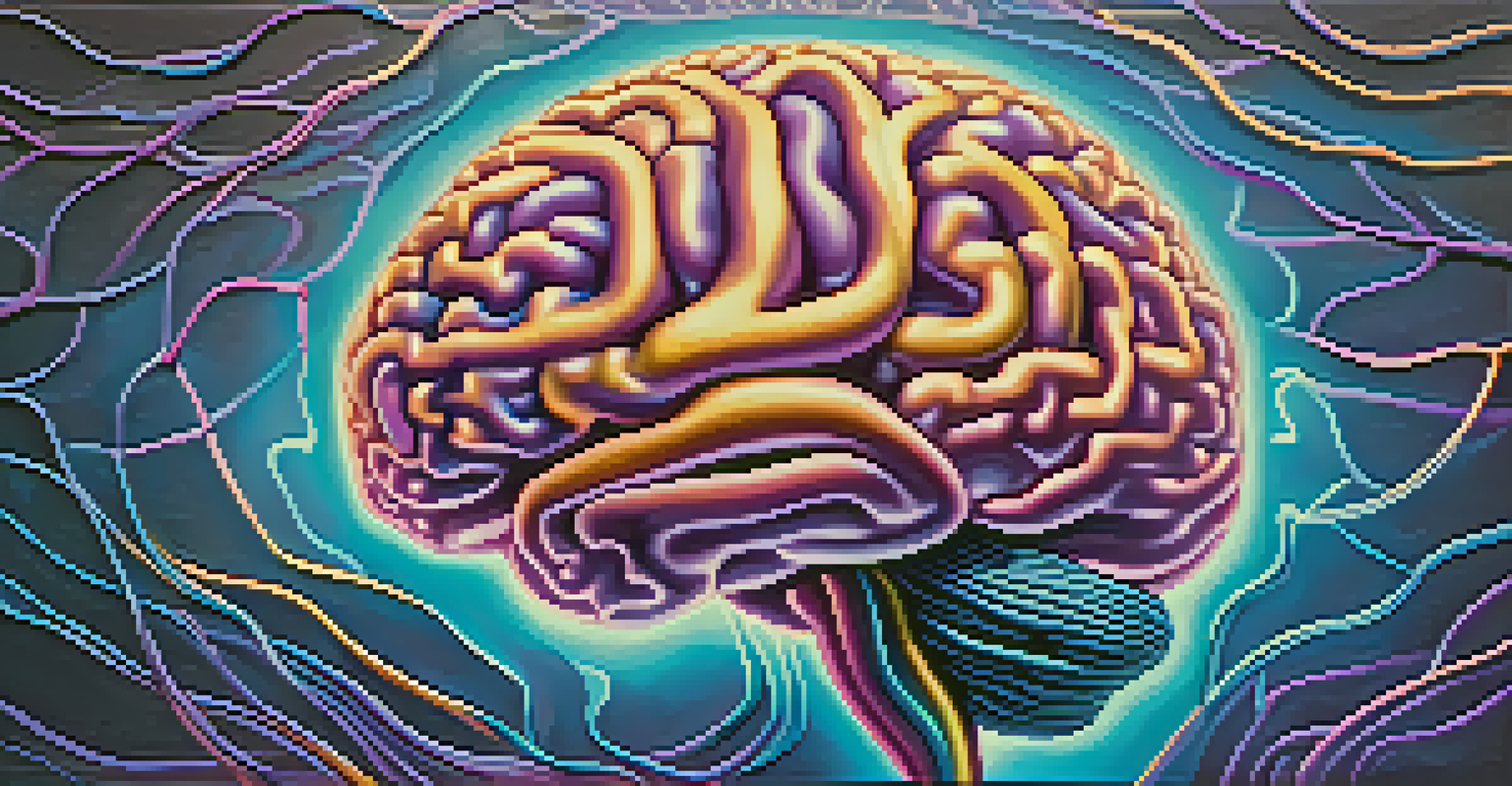Psychedelic-Assisted Therapy: A New Frontier in Treatment

Understanding Psychedelic-Assisted Therapy
Psychedelic-assisted therapy combines psychotherapy with the use of psychedelic substances, such as psilocybin or MDMA. This innovative approach aims to enhance therapeutic outcomes for individuals struggling with various mental health conditions. By facilitating profound emotional experiences, psychedelics can help patients confront deep-seated issues that traditional therapies might miss.
Psychedelics can help patients confront deep-seated issues that traditional therapies might miss.
During a session, a trained therapist guides the patient through their emotional journey while they are under the influence of the psychedelic. This supportive environment fosters vulnerability, allowing individuals to process trauma, anxiety, or depression more effectively. The therapist's role is crucial, as they provide a safe space for exploration and healing.
Research indicates that this method can lead to significant improvements in mental health symptoms, often after just a few sessions. As more studies emerge, the potential for psychedelics in therapeutic settings is gaining recognition, marking a shift in how we approach mental health treatment.
The Science Behind Psychedelics and Healing
Psychedelics work by altering brain chemistry and stimulating neural pathways, which can lead to transformative experiences. Studies show that these substances may promote neuroplasticity, the brain's ability to reorganize and form new connections. This adaptability is essential for healing, especially in the context of trauma and mental illness.

For instance, research on psilocybin has shown promise in treating depression and anxiety, particularly for patients facing terminal illness. Participants often report a sense of connectedness and clarity during their experiences, which can help shift their perspective on life and death. This can be particularly therapeutic when dealing with existential dread.
Psychedelics Enhance Therapy Outcomes
Psychedelic-assisted therapy combines psychotherapy with substances like psilocybin to improve treatment for mental health conditions.
Moreover, the calming and introspective nature of psychedelics can facilitate profound insights, helping individuals break free from negative thought patterns. This scientific understanding underscores why many mental health professionals are excited about integrating psychedelics into treatment protocols.
Historical Context of Psychedelics in Therapy
Psychedelics have a rich history in various cultures, often used in spiritual and healing practices long before modern medicine recognized their potential. In the 20th century, researchers began exploring these compounds for therapeutic purposes, with early studies showing promising results. However, the rise of counterculture in the 1960s and subsequent legal restrictions led to a halt in research.
The future of psychedelic-assisted therapy is bright, with increasing acceptance and ongoing research paving the way for new possibilities.
Fast forward to today, the tide is turning. A resurgence of interest in psychedelics is evident, spurred by new research and changing societal attitudes. Organizations like MAPS (Multidisciplinary Association for Psychedelic Studies) are leading the way in rigorous clinical trials, paving the path for more widespread acceptance and understanding.
This historical context is vital in appreciating where we are today. Learning from past missteps allows us to approach psychedelic-assisted therapy with both caution and enthusiasm, ensuring its responsible integration into modern mental health care.
Current Research and Clinical Trials
Currently, numerous clinical trials are underway to investigate the efficacy of various psychedelics in treating conditions like PTSD, depression, and addiction. These studies are meticulously designed to assess the safety, dosage, and therapeutic benefits of psychedelics in controlled environments. Initial results have been promising, often showing rapid and lasting improvements in participants' mental health.
For example, recent trials involving MDMA-assisted therapy for PTSD have demonstrated significant reductions in symptoms for participants after just a few sessions. This is particularly important for veterans and survivors of trauma who have struggled to find relief through conventional means. The hope is that these findings will lead to FDA approval for these treatments in the near future.
Growing Evidence Supports Efficacy
Research shows promising results for psychedelics in treating PTSD, depression, and addiction, indicating a shift in mental health care.
As more evidence accumulates, the landscape of mental health treatment is poised to change dramatically. The success of these trials could not only validate the use of psychedelics in therapy but also encourage further research into their potential applications.
The Role of Therapists in Psychedelic-Assisted Sessions
In psychedelic-assisted therapy, the therapist plays a pivotal role in guiding the patient's experience. Their training equips them to facilitate a safe and supportive environment, helping patients navigate their emotional journeys. This relationship is built on trust, which is essential for individuals to feel comfortable exploring vulnerable feelings.
Therapists often use techniques such as active listening and mindfulness to help patients process their experiences during and after the psychedelic session. They may encourage patients to reflect on their insights, fostering deeper understanding and integration of these transformative moments into their daily lives. This integration is crucial for lasting change.
Furthermore, therapists must be attuned to the unique needs of each individual, adapting their approach as necessary. This personalized care can make all the difference in how effectively a patient can confront their challenges and ultimately heal.
Ethical Considerations and Challenges
As promising as psychedelic-assisted therapy is, it does come with ethical considerations that must be addressed. The potential for misuse or over-enthusiasm about psychedelics raises questions about accessibility and safety. Ensuring that therapy is conducted in a controlled, professional environment is paramount to avoid harmful experiences.
Additionally, there is the concern of equitable access to these therapies. As they become more mainstream, it's crucial to ensure that diverse populations are represented in clinical trials and can benefit from these treatments. This means addressing potential barriers such as cost, availability, and cultural stigma surrounding mental health.
Ethics and Access are Critical
Ensuring ethical practices and equitable access to psychedelic therapies is essential as they gain acceptance in mainstream treatment.
Navigating these challenges requires a collaborative approach among researchers, healthcare providers, and policymakers. By prioritizing ethical standards and inclusivity, we can foster a climate where psychedelic-assisted therapy is both effective and accessible to those in need.
Looking Ahead: The Future of Psychedelic Therapy
The future of psychedelic-assisted therapy is bright, with increasing acceptance and ongoing research paving the way for new possibilities. As we continue to learn about these substances and their effects, it's likely we'll see expanded applications in mental health treatment. This could lead to breakthroughs for conditions that currently have limited treatment options.
Moreover, the integration of psychedelics into mainstream therapy could revolutionize how we approach mental health care. Imagine a world where individuals can access these transformative therapies legally and safely, guided by trained professionals. This vision is becoming more tangible as societal perceptions shift and evidence mounts.

As we stand on this exciting frontier, it's essential to remain grounded in compassion and ethics. By prioritizing patient well-being and responsible practices, we can harness the potential of psychedelics to create lasting change in mental health treatment.